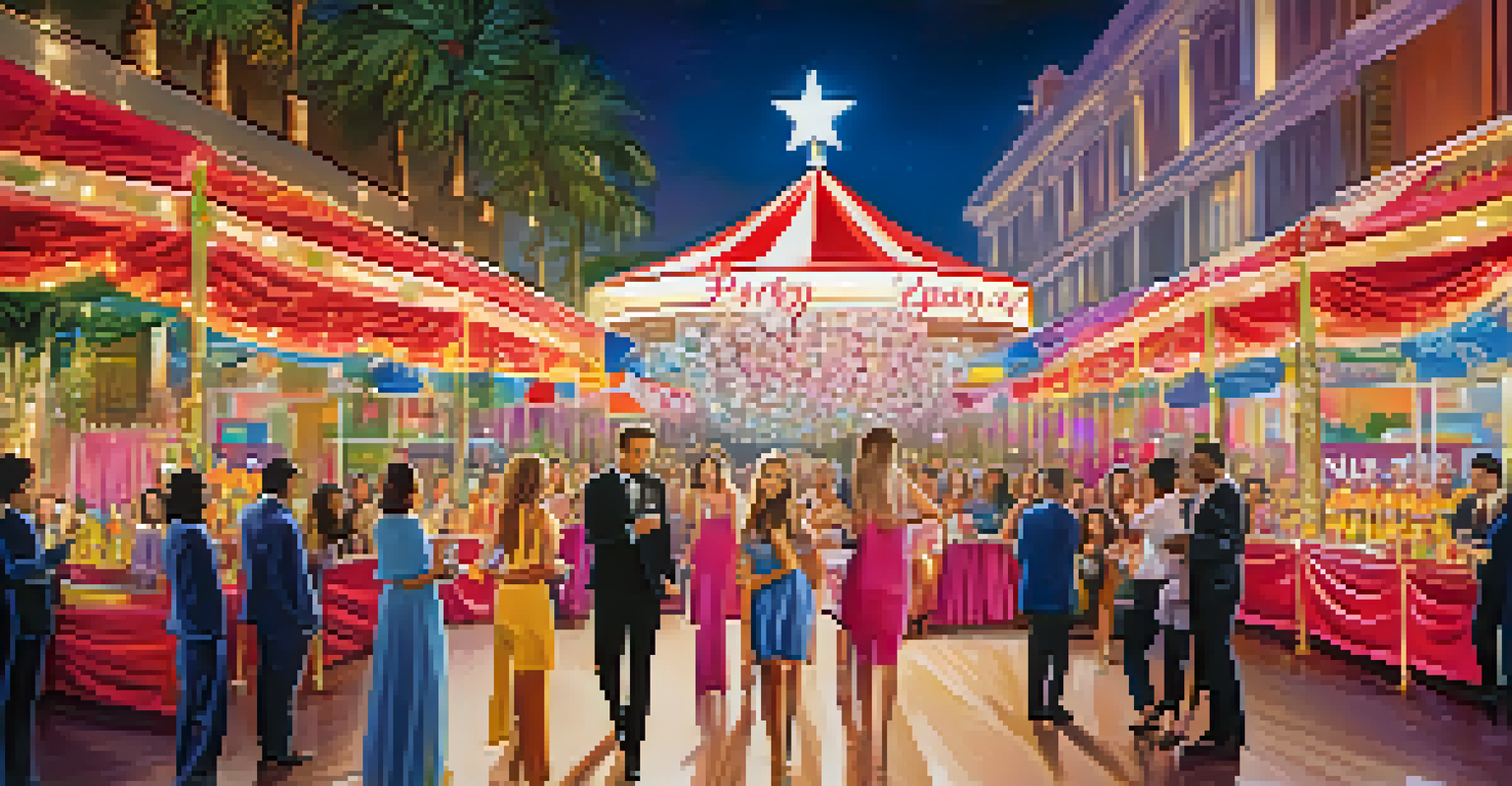The Role of Reality TV in Shaping Celebrity Culture Today

Reality TV: A Catalyst for Celebrity Fame
Reality TV has become a significant force in shaping modern celebrity culture. Shows like 'Keeping Up with the Kardashians' have propelled ordinary individuals into stardom, showcasing how personal lives can become entertainment. This phenomenon highlights the shift from traditional celebrity pathways, such as film or music, to new avenues where anyone can be a star.
Reality television is the ultimate expression of our obsession with fame and celebrity.
The allure of reality TV lies in its relatability; viewers see themselves in the lives of these stars, creating a deeper connection. This democratization of fame means that charisma and drama often outweigh talent or skill, making the path to celebrity more accessible. Consequently, we see a surge in individuals vying for their moment in the spotlight through these platforms.
As a result, the definition of a celebrity has expanded, encompassing influencers and reality stars who may not fit conventional molds. The rise of social media further amplifies this trend, allowing these personalities to cultivate their brand and connect directly with fans. This shift not only impacts how we perceive fame but also how we engage with celebrities.
The Power of Social Media in Celebrity Culture
Social media plays a crucial role in amplifying the influence of reality TV stars. Platforms like Instagram and TikTok allow these individuals to share their lives in real-time, fostering a sense of intimacy with their audience. This direct line of communication blurs the lines between public and private life, creating a unique dynamic in celebrity interactions.

Moreover, social media empowers fans to engage actively with their favorite stars, creating a two-way street of influence. Reality TV personalities often rely on their online presence to maintain relevance and expand their audience. This constant engagement keeps them in the public eye, making it essential for their careers.
Reality TV Redefines Celebrity Fame
Reality TV has transformed how ordinary individuals can achieve celebrity status, shifting the focus from traditional pathways to personal narratives.
As viewers become more invested in the day-to-day lives of these celebrities, it reinforces the notion that anyone can achieve fame. The accessibility of social media democratizes fame further, giving rise to a new generation of stars who thrive on their online personas. This shift underscores the importance of digital presence in shaping celebrity culture today.
The Evolution of Celebrity Branding
Reality TV has redefined how celebrities market themselves, leading to a new era of branding. Stars often curate their public personas through strategic social media use, showcasing their lifestyles and values. This branding goes beyond mere promotion; it becomes a way for them to connect with fans on a personal level.
The rise of social media has transformed the way we engage with celebrities, creating a two-way street of influence.
For example, many reality stars launch their product lines or fashion collaborations, leveraging their fame to build business empires. The blurring of lines between personal life and brand identity means that fans buy into not just the products but the lifestyle associated with them. This trend emphasizes authenticity, as audiences often gravitate towards those who seem relatable and genuine.
As reality TV continues to evolve, so does the concept of celebrity branding. Today's stars must navigate a complex landscape where their choices and actions are scrutinized in real-time. This reality requires them to be savvy marketers, using their platform to create a lasting impact in both the entertainment and business worlds.
Diversity in Reality TV and Celebrity Culture
Reality TV has played a pivotal role in promoting diversity within celebrity culture. Shows featuring diverse casts and perspectives have gained traction, broadening the representation of different backgrounds. This shift allows a wider audience to see themselves reflected in media, breaking traditional molds of who can be a star.
Programs like 'RuPaul's Drag Race' and 'The Real World' have given rise to diverse voices, showcasing narratives that were once sidelined. This representation not only enriches the viewing experience but also fosters conversations around inclusivity and acceptance. As a result, reality TV helps to challenge stereotypes and promote understanding among varying cultures.
Social Media Enhances Celebrity Engagement
Platforms like Instagram and TikTok allow reality TV stars to connect intimately with fans, further democratizing fame and influence.
The impact of this diversity extends beyond the screen; it influences fashion, beauty standards, and social issues. Fans draw inspiration from these stars, leading to shifts in societal norms and expectations. By amplifying underrepresented voices, reality TV contributes to a more inclusive celebrity culture that resonates with a broader audience.
The Impact of Scandals in Reality TV
Scandals have become synonymous with reality TV, often driving viewer engagement and shaping celebrity narratives. From dramatic breakups to controversial statements, these incidents capture public attention and keep audiences coming back for more. The line between scripted drama and real-life events often blurs, creating a unique form of entertainment.
Moreover, these scandals can significantly impact a celebrity's career, either propelling them to new heights or leading to public backlash. For instance, a controversial moment can spark discussions and debates, making the celebrity a trending topic on social media. This phenomenon illustrates how reality TV stars navigate the complexities of public perception in an age of constant scrutiny.
Ultimately, scandals highlight the precarious nature of celebrity culture today. While they can create buzz, they also serve as a reminder of the potential consequences of living life in the limelight. The relationship between reality TV and celebrity scandals underscores the need for stars to manage their public image carefully.
The Influence of Reality TV on Traditional Media
Reality TV's rise has significantly influenced traditional media outlets, leading to a shift in content creation. With the success of reality formats, networks are increasingly investing in similar programming to attract viewers. This trend reflects the changing preferences of audiences who crave authentic, unscripted content over traditional narratives.
For instance, news outlets now often feature segments discussing reality TV stars and their impact on society. This crossover highlights the growing importance of reality TV in shaping public discourse and trends. As a result, traditional media must adapt to this evolving landscape to remain relevant.
Diversity Shapes Modern Celebrity Culture
Reality TV promotes diverse representation, enriching media narratives and fostering conversations about inclusivity in celebrity culture.
Moreover, the integration of reality TV elements into scripted shows points to a blending of genres. Audiences are treated to a mix of reality and fiction, creating a new hybrid form of entertainment. This convergence showcases the lasting impact reality TV has on the broader media ecosystem and its ability to shape cultural narratives.
The Future of Celebrity Culture and Reality TV
As we look ahead, the relationship between reality TV and celebrity culture will continue to evolve. With advancements in technology and changing audience preferences, new formats and genres will likely emerge. This evolution could lead to even more diverse and inclusive representations in the celebrity landscape.
Furthermore, the rise of virtual reality and augmented reality may redefine how we engage with celebrities. Imagine experiencing a day in the life of your favorite star through immersive technology; this could revolutionize fan interactions. Such innovations could blur the lines between reality and fantasy, offering unprecedented access to celebrity lives.

Ultimately, the future of celebrity culture will be shaped by the ongoing dialogue between viewers and the stars they idolize. As reality TV continues to adapt and innovate, it will play a crucial role in defining what it means to be a celebrity in the years to come. The journey of reality TV and its influence on celebrity culture is far from over.